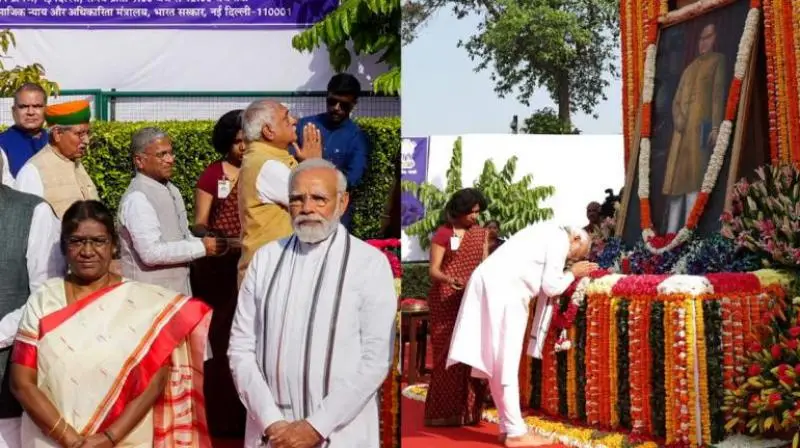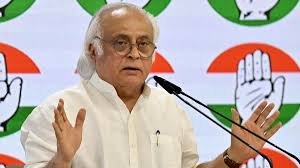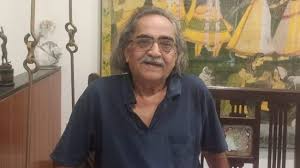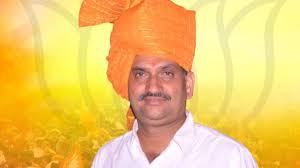President Murmu, PM Modi Lead Nation in Remembering Dr. B.R. Ambedkar on His 135th Birth Anniversary
India paid heartfelt tribute to Dr. Bhimrao Ramji Ambedkar on April 14, 2025, as the nation observed his 135th birth anniversary. On this significant day, floral tributes, public events, and heartfelt messages from the country’s political leaders marked the occasion. From New Delhi to remote villages, millions honored the man who laid the foundation of modern India’s democratic and inclusive ideals.

Nation’s Leaders Pay Their Respects
At the forefront of the celebrations, President Droupadi Murmu and Prime Minister Narendra Modi led the tributes by offering flowers at Ambedkar’s statue at the Parliament complex in New Delhi. Moreover, Vice President Jagdeep Dhankhar, BJP President JP Nadda, Congress leaders Sonia Gandhi, Rahul Gandhi, and Mallikarjun Kharge, along with Delhi Chief Minister Rekha Gupta, joined the event.
These leaders acknowledged Ambedkar’s unparalleled contribution to shaping the Indian Republic. In particular, they recognized his role in drafting the Constitution, which continues to guide India’s democratic journey.
President Murmu Reflects on Ambedkar’s Legacy
President Murmu expressed admiration for Ambedkar’s lifelong commitment to building an inclusive society. She emphasized his dedication to social justice and the empowerment of marginalized communities. Furthermore, she urged citizens to continue his mission of equality and unity. The President highlighted that Ambedkar’s ideals remain crucial for building a stronger, more united India.
Prime Minister Modi’s Message of Inspiration
Prime Minister Narendra Modi also paid tribute to Ambedkar’s memory. On social media, he shared his thoughts on X (formerly Twitter), stating, “Babasaheb Ambedkar’s life and teachings continue to inspire our journey toward social justice and national development. His dream of an inclusive, empowered, and self-reliant India guides our every step.”
In addition, the Prime Minister noted that Ambedkar’s vision plays a vital role in shaping the government’s efforts to empower disadvantaged communities and promote equal opportunities for all.
Public Holiday Observed Nationwide
Ambedkar Jayanti is a public holiday in many parts of the country. As a result, government offices, schools, and banks remain closed. People across states organize commemorative events in his honor. Citizens from all walks of life participate in remembering the man who fought tirelessly for justice and human dignity. They light candles, host community feasts, and engage in educational discussions.
Notably, memorials like Chaitya Bhoomi in Mumbai and Ambedkar Bhawan in New Delhi saw large gatherings, where people paid their respects and participated in cultural performances and social awareness drives.
Remembering Ambedkar: A Man of Vision and Resolve
Born on April 14, 1891, in Mhow (now in Madhya Pradesh), Bhimrao Ambedkar rose from humble beginnings to become one of India’s most respected intellectuals and reformers. Despite facing caste discrimination from an early age, he emerged as a champion of the oppressed and a symbol of resistance against deeply rooted social inequality in Indian society.
Moreover, Ambedkar excelled in academia, earning doctorates in economics and law from prestigious institutions like Columbia University and the London School of Economics. However, his academic pursuits always focused on his larger mission—uplifting the downtrodden and ensuring justice for all.
Architect of the Indian Constitution
Ambedkar’s most enduring contribution came as the chairman of the drafting committee of the Indian Constitution. Between 1947 and 1950, he led efforts to create a framework that ensured liberty, equality, and justice for every citizen. As a result, the Indian Constitution, adopted on January 26, 1950, stands as a testament to his foresight and commitment to democracy.
Today, people often refer to him as the “Father of the Indian Constitution.” This title reflects his deep involvement and ideological influence in crafting the document that would shape the future of the world’s largest democracy.
Contributions Beyond Law and Governance
Beyond legal reforms, Ambedkar’s influence extended to India’s financial architecture. In 1951, he helped establish the Finance Commission of India, which coordinates fiscal relations between the Centre and the states. In addition, his economic vision contributed to the foundation of the Reserve Bank of India. While the RBI was established in 1935, its foundation was based on ideas Ambedkar proposed in his thesis on Indian currency and finance.
Bharat Ratna and Enduring Influence
Dr. Ambedkar passed away on December 6, 1956. Nonetheless, his contributions continue to shape India’s path, even decades after his death. In recognition of his invaluable service to the nation, the Indian government posthumously awarded him the Bharat Ratna, the highest civilian honor, on March 31, 1990.
Over the years, his ideas on equality, secularism, and social reform have gained renewed importance in public discourse. Movements advocating for Dalit rights, education reforms, and social inclusion often draw inspiration from his teachings.
A Day of Reflection and Renewal
Ambedkar Jayanti is more than just a commemoration—it reminds us of the principles on which India was built. As political leaders, students, scholars, and ordinary citizens reflect on Ambedkar’s life, the day serves as a national call to uphold his values in today’s world.
At a time when societies across the globe are grappling with inequality and discrimination, Dr. Ambedkar’s legacy serves as a beacon of hope and resilience. His life story remains a powerful example of how education, conviction, and vision can change the course of history.






